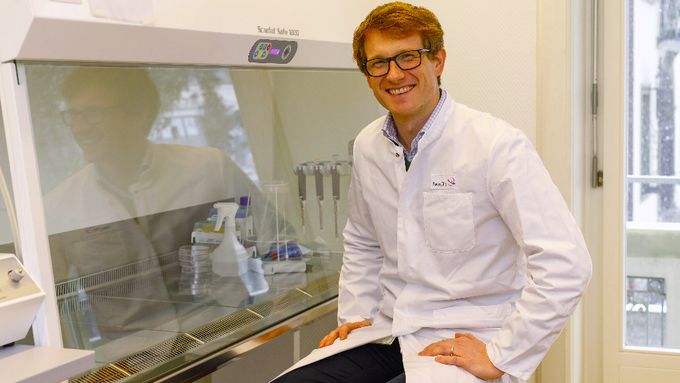Andrej Trauner Wins Swiss TB Award
21.03.2018
Tuberculosis still kills 1.7 million people annually and the rate of resistance against current treatments continues to increase. It is therefore key that we understand this infectious disease better and devise new treatments to control it. To mark World Tuberculosis Day on 24 March, the Swiss Foundation for Tuberculosis Research gave this year’s Swiss TB Award to Andrej Trauner and Anna Rominski. Andrej Trauner, scientist at Swiss TPH, receives the award in recognition of his research on the mechanics of combination therapy against tubercle bacilli.

Andrej Trauner, Swiss TPH, wins the Swiss TB Award 2018 for his research on the mechanics of combination therapy against TB. (photo: Joachim Pelikan/Swiss TPH)
Approximately 10 million people will be infected with tuberculosis (TB) in 2018 alone. In most cases the infection will be curable, however for many people the infection will mark the beginning of a long struggle with drug resistant TB.
Why does combination therapy work as well as it does?
Drug resistance in TB is as old as the efforts to treat the disease with antibiotics. The best way to prevent resistance is by combining several antibiotics. Until now, however, it was largely unclear why such combination therapies work as well as they do.
Andrej Trauner at Swiss TPH now made an important step towards understanding the mechanics of combination therapy. The Swiss Foundation for Tuberculosis Research recognised the contribution of his research by awarding him the Swiss TB Award to mark World TB Day. He shares the award with Anna Rominski from the Institut für Medizinische Mikrobiologie of the University of Zurich. The Swiss TB Award honours the best research work in the field of tuberculosis in Switzerland.
“Successful treatment of tuberculosis relies on the use of several antibiotics at the same time. In our study, we were able to find a biological signature of that success. We can now use this knowledge to better evaluate new treatment combinations,” said Andrej Trauner.
“New understanding may accelerate TB research”
Together with colleagues, Andrej Trauner investigated how populations of tubercle bacilli respond to treatment within tuberculosis patients. Every time a bacterium divides, it can gain a genetic change, a mutation. Some of these changes can lead to drug resistance. Bacteria divide almost continuously within patients and the researchers observed that tubercle bacilli constantly try to find a way of becoming resistant. If the administered treatment is not potent enough they will eventually succeed. But if a sufficiently effective combination of antibiotics is applied, the ability of the bacilli to come up with new solutions is decreased and all paths to resistance are blocked.
Although the results sound intuitive, this is the first study to show this phenomenon in action within patients. “Understanding how bacterial populations change in response to drug pressure allows us to assess the activity of new drug combinations to treat drug resistant tuberculosis more effectively,” said Andrej Trauner.“Hopefully this knowledge will accelerate research into future treatments.”
Antimicrobial resistances (AMR) on the rise
Drug resistance is increasing worldwide. Every year, around 700,000 people die due to infection from drug resistant bacteria, viruses, fungi and parasites. Without counter measures, experts estimate that by 2050, the annual death toll could increase to 10 million. Around a quarter will come from drug-resistant strains of TB. The misuse and overuse of antimicrobials in people and animals is accelerating this process.
From TB research to implementing projects
Swiss TPH is a world-leading institute with a broad range of activities in the field of TB and antimicrobial resistance. Swiss TPH works on five continents both on human and animal TB and from basic research to health systems. The activities span from the host-pathogen interaction, to the evolution of antibiotic resistance and the host immune responses to TB infection.
Stay connected
Subscribe to our newsletter and get all the latest research news, project updates, course and event listings from Swiss TPH.